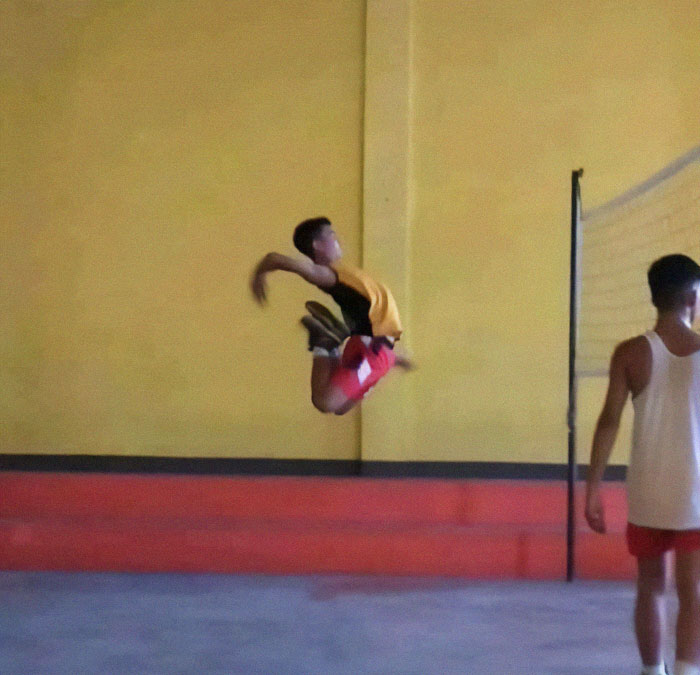People often spend a lot of time and energy on the most curious items that they stumble upon online. You know, those pictures that if you stare at long enough, subtle uneasiness spreads over you gradually, or the ones which are just totally absurd? Have you ever thought that maybe these kinds of things have always been there in the internet? We often get the feeling as though we are always bombarded by these peculiar things and it might sometimes be rather confusing.
-

-

-

-

-

-
People like to choose glossy-looking aesthetics and meticulously prepared scenes when it comes to posting images online. This is something that we have heard for a long time. The purpose of these pictures is to showcase the positive aspects of life. However, in actuality, the internet is a realm that is nothing short of wonderfully strange. By displaying some of the most out-of-context photographs that make the internet world appear to be one giant chaotic mess, the 'Some Images' Facebook page is here to break your bubble and show you. An uneven playing ground for soccer? It's true. There is a rock that looks like an Xbox controller, right? Certainly. What would you call an elevator that turns out to be nothing more than a standard flight of stairs? It was obvious to you. It has a great deal of stuff that at the very least leaves people feeling a little perplexed and a great deal entertained.
This page's creator has embarked on a journey to collect the most ludicrous photographs of people and animals circulating online, and it appears that they are succeeding in their endeavor rather than failing. When you look at these pictures, it is impossible to tear your glance away from them since they are so captivating that they are the ideal attention-grabbing device. -

-

-

While you are scrolling through this list, you will notice how vividly it portrays the strange side of humanity and how accessible these photographs are to interpretation. Objects that are difficult to classify have the potential to throw us off our game, forcing us to direct our attention toward the resolution of these puzzling issues. Because, after all, many of us have a strong need to comprehend what is immediately in front of us, and if we are unable to identify what it is that we are looking at, we begin to experience feelings of unease and confusion.
Gregor Kennedy, a professor of higher education, and Jason M. Lodge, a psychologist who specializes in the study of psychology, both believe that bewilderment is typically encountered when we come across new knowledge. More so when this new information is difficult to understand, goes against common sense, or is completely different from anything we have ever experienced before. In spite of the fact that it is difficult to argue that feeling bewildered is at least a little bit annoying, it can be helpful (and sometimes even required!) when we are trying to learn something new. It is important to note that perplexity is a component of the epistemic emotions. In other words, it’s a feeling that’s especially related with the development of our knowledge and understanding. -

-

It was mentioned by the writers that there are two distinct sorts of confusion: useful and unnecessary confusion. "When people are trying to learn something new, confusion is often seen as a negative, something to be avoided," they stated in their report. There are not many of us who would readily believe that a great learning experience is coupled with a condition of bewilderment. One of the most obvious reasons for this is that perplexity, when it continues for an extended period of time, can very easily develop into feeling frustrated or bored. People should make every effort to avoid getting themselves into circumstances like this, since they are only a few steps away from disengaging from the topic and giving up on it.
-

-

-

Recognizing that we are experiencing confusion and taking measures to ensure that it does not persist for an excessive amount of time is the most crucial thing that we can do to make our confusion work for us. Therefore, the first thing that we need to do is acknowledge that we are having perplexity regarding the situation. It has been challenging for the majority of individuals who participated in our study to acknowledge that they had been perplexed by the phenomenon that we were investigating. After conducting in-depth interviews, the researchers came to the realization that it is not disclosed until a considerable amount of time has passed. This is not something that should come as a surprise because there is a negative perception that is associated with confusion. One of the most widespread misunderstandings is that it is a sign of stupidity or a lack of intelligence. However, this is not the case. In order to be able to harness this emotion when you are confronted with challenges that involve new ideas and concepts, you must first accept that it exists. Only then will you be able to harness it. "Be comfortable with this, but seek to resolve it."
-

-

-

However, in today's world, complicated ideas are frequently presented in a manner that is simple, interesting, and amusing in order to appeal to the general public. Videos in the media and on the internet may swiftly convey complex concepts by using narration that is simple to comprehend and animations that flow smoothly. "It can be easy to find information about highly complex phenomena, such as climate change or vaccination, that seems easy to understand and aligns well with our intuitive conceptions (or misconceptions!)," according to the researchers. "The internet has made it easy to find highly engaging and appealing explanations of phenomena that are very good at cutting down the complexity to make these concepts understandable."
-

-

-

On the other hand, they contended that in order to completely comprehend the advantages of confusion, we must possess an understanding of two lessons. To begin, the fact that we are unable to comprehend complicated ideas and occurrences may indicate that we are exerting a sufficient amount of mental effort in our pursuit of comprehension. The fact that one does not initially find innovative and complicated ideas to be confusing can be an indication of overconfidence, which has been demonstrated time and again to be detrimental to the learning process.
Secondly, it is essential for individuals to acknowledge that the process of learning is accompanied by an element of struggle and bewilderment. "When encountering new, complex ideas, it is useful to find them challenging and confusing, so long as the confusion does not persist too long," according to the research of Lodge and Kennedy. "The struggle associated with overcoming confusion helps us to find better strategies for understanding the world." -

-

-

-

-

-

-

-

-

-

-

-

-

-

-

-

-

-

-

-

-

-

-

-

-

-

















































0 Comments